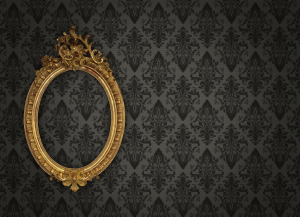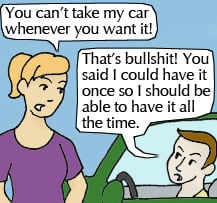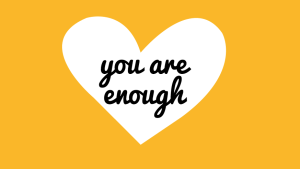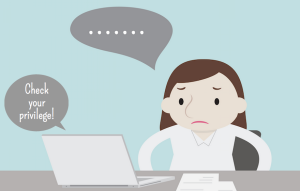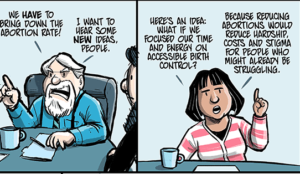I remember talking with a friend of mine who is transgender with the assumption that we both experienced dysphoria, which is the distress or discomfort that occurs when the gender someone is assigned does not align with their actual gender.
As I was talking, I could see their eyes start to stare off in another direction.
“Are you alright?” I asked, puzzled by their sudden disinterest in our conversation.
On an ordinary day, Kai and I could talk gender for hours. The only person who seemed more passionate about trans identity than me was definitely Kai.
But suddenly, in conversation that should’ve excited them, they seemed to be someplace else entirely.
“Well, I don’t…” Kai paused. “Don’t judge me or anything, but like, I don’t experience dysphoria.”
At that point, I had never heard of a transgender person not experiencing some kind of dysphoria. But there they were, right in front of me.
My instinct was to be protective over my transness. The idea that dysphoria was not required, and that anyone could just identify as trans if they wanted to, seemed to water down the importance of my identity and the struggles of my community.
No — their community. Our community.
I was getting possessive, trying to deny Kai’s identity, which was so unlike me. Just a minute ago, Kai was my comrade; now, suddenly, I was pushing them to the margins. Why would I try to tell someone what their gender is and isn’t, having spent a lifetime of being told the same?
“Yeah, I get it,” they said, seeming to read my mind. “It’s threatening to a lot of people, so I don’t often talk about it.”
But in my years as an advocate, I continue to meet more trans folks like Kai who don’t experience dysphoria, and further, who are afraid to open up about it.
I’ve been lucky enough to learn from them, and I understand now why my gut reaction – to exclude them – was such a problematic one.
So why shouldn’t we define transgender people on the basis of dysphoria?
Let’s talk about it.
1. It Suggests That Gender Identity Is for Outsiders to Decide
It’s weird that some trans people are totally on-board with making a rulebook for transness, instead of encouraging people to self-identify and declare their gender identities for themselves.
When we allow other people to make the rules, we strip away the rights of trans people to self-identify. If we tell trans people that their identities don’t belong to them, we uphold a culture where the naming of gender identities belongs to outsiders instead of ourselves.
When I started to doubt Kai’s transness, what I was saying to them was, “You say that you’re transgender, but I don’t recognize that or believe that.” I was saying that I knew Kai’s gender better than they did. Yikes.
I don’t know about you, but I don’t want to exist in a world where I have to follow a set of prescribed rules before I can claim my own identity.
I should be able to declare what my gender is and have it validated, regardless of how I experience it.
Transgender people constantly have to resist having an assigned gender imposed on them. Do we really want to assign and impose a gender onto other trans people?
2. It Medicalizes the Experience of Being Transgender
The phrase “gender dysphoria” became the go-to phrase after “gender identity disorder” was deemed offensive and inaccurate. Since then, the two phrases have been used interchangeably in the medical realm.
Need I remind you that Western medicine has been less than kind to trans people historically?
Trans people were “treated” by being encouraged to conform and accept their assigned gender rather than transitioning. Medicalizing the lives of trans people hurt us for a long, long time – it meant that we were treated as having a psychological disorder rather than a valid identity.
Placing the lives of trans people into an “illness” framework ultimately stigmatized their identities and left their needs to be dictated my “medical professionals” rather than trans people themselves.
The medical model disempowered trans people.
Trans people were treated as deviants with a shameful mental disorder, and language like “gender identity disorder” and “gender dysphoria” is tied to that history. The medicalization of trans people was a major source of oppression and harm.
When you suggest that dysphoria is the one way of determining whether or not someone is trans, you are relying on a medical model that wasn’t created by trans people, but rather, created by Western medical “professionals” who viewed transness as a disorder rather than an identity.
And I’d like to move as far away from this framework as possible.
Changing it from “gender identity disorder” to “gender dysphoria” doesn’t change the fact that it’s still operating within the same medical model and still functioning as a “diagnosis.”
3. It’s a Eurocentric Definition of Transgender
A lot of trans folks will say that “transgender” as an experience didn’t originate in the West – and they would be correct. There have been “trans” experiences in many cultures globally, long before the West had any concept of “transgender.”
Some identities outside of the West that you might know of include two-spirit, hijra, and kathoeys, and they have a history that precedes ours.
Many trans folks in the Western world insist that to be transgender is to be dysphoric, without acknowledging that this is a very Western understanding of what it means to be trans.
It doesn’t acknowledge that transness can exist outside of the West and has existed outside of it long before we came along – with its own definitions, language, insights, and experiences.
To say that being transgender is exclusively about experiencing dysphoria is making a universal statement for all trans people, but it’s steeped in Western understandings about gender. It completely erases indigenous and international identities and experiences.
It’s tricky (and sometimes, really problematic) to apply individual understandings of gender to all people.
“Transgender” as an umbrella is so diverse and complex that it’s best to avoid generalizations altogether, and allow people to name their own experiences.
4. It Equates Being Trans with Distress and Dysfunction
If someone came up to you and asked you what it was like to be transgender, it probably wouldn’t be as simple as saying, “It’s terrible.”
It can be terrible. The pain can be very real. But for most people, being trans is a very complicated thing that involves a whole spectrum of emotions.
This is kind of where using dysphoria as the exclusive defining characteristic of trans people isn’t necessarily an accurate way of representing the experience of being trans.
As a trans person who does experience dysphoria, I can tell you that dysphoria is not the only thing that makes me transgender. It’s not even the bulk of my experience as trans.
It’s about the journey it took to disregard expectations and find myself. It’s about the layers I had to peel away just to figure out who I was. It’s about the pride and elation I felt when I found the words to describe my identity. It’s about the sense of community I found with others like me. It’s the way that I understand gender and the way that I move through the world.
Gender is complex. Transgender even more so.
The thing that Kai and I have in common is that we underwent a process in trying to understand ourselves and our gender, teasing apart what society asked of us and what we wanted for ourselves. We both discovered through that process that we didn’t identify with the gender we were assigned at birth.
The difference is that this realization doesn’t cause distress for Kai in the way that it does for me.
And if that’s the only difference, so what?
If distress is the defining characteristic, what are we saying about what it means to be trans? And what are we telling our youth, then, too? That who they are is contingent on how much pain they feel?
I want to live in a world where transgender doesn’t equate to pain and suffering. Because ultimately, the pain we feel is not what unites us. It’s the identity we claim and the unique journey we each took to find it.
I don’t want any trans person to go through this thinking that to be trans means to hurt. That only succeeds in saying to the world, “If you want to be in pain, be trans. If you want to be happy, be cis.”
We are so much more than that. Our lives and our experiences are so, so much more.
5. We Privilege Some Narratives Over Others
I’ve been told before that I’m not “trans enough.”
I was hurting so much the first time I heard it that I actually blogged about it (this was, pretty ironically, before I understood the asterisk is problematic).
As a genderqueer writer, I’ve been told more than once that I have no business writing about the transgender community because I’m not “actually trans.”
And since I experienced that kind of invalidation, I’ve been sitting pretty comfortably in the camp of “everyone is trans enough and your gatekeeping is bullshit.”
At what point will we stop tearing each other apart and start lifting each other up?
I know what it feels like to have an identity that completely opened up your mind and your world, something that gave you new life and a sense of home, come crumbling down at the accusation that you’re not actually trans and, instead, just following the latest trend.
I’m just not interested in creating a power dynamic where some trans people are inherently better, more worthy, more trans, or more important than other trans people. That, to me, is not what social justice looks like.
Using dysphoria as the ultimate measure of transness means that any trans person for whom dysphoria is not present, not the language or framework they prefer to use, or not significant in their experience is suddenly invalid.
It says, “These trans people are the real trans people, and everyone else should be quiet.”
Our community has a history of doing this. Take, for instance, the transgender community’s initial resistance to including non-binary people.
Oh wait, that’s not history. That still happens.
I’m fed up with the power dynamics in our community and see absolutely no need to create more; we are still struggling day after day to dismantle the hierarchies that already exist.
We can already see the ways that certain narratives are privileged over others, the ways that certain voices are heard and others are silenced. And frankly, I don’t want to be a part of that.
I think we should be disrupting those narratives – not going along with them.
We should be affirming that the trans community is diverse, complex, and unique – not monolithic and homogenous.
6. It Breeds Transphobia
There is a pervasive fear that if we leave “transgender” as a term that relies on self-identification, it will be rendered meaningless by people who claim it for the wrong reasons.
But this weirdly mirrors a lot of oppressive attitudes that are used against all trans people.
Take the trans bathroom debate, for instance. There is a widespread belief that cis people will pretend to be trans just to get into the wrong restroom and violate other people.
Um, when you’re on the side of Fox News, maybe it’s time to reevaluate your stance.
If trans people interrogate other trans people with disbelief, we are giving permission to the rest of the world to do it to us.
If we bully trans people and tell them they are deceiving other people, or following a fad, we’re telling cis people that they can accuse us of being imposters, too.
We’re taking away the right to self-identify and giving the rest of the world permission to misgender us if they, too, decide we’re not “trans enough.” We tell the rest of the world that they don’t have to believe us because we don’t believe in each other.
If you don’t believe a trans person when they say that they are trans, why should a cis person believe you?
***
When my friend told me that they didn’t experience dysphoria, my initial reaction was one of hostility, judgment, and skepticism. I’m forever grateful, though, that they took the time to educate me.
I had no idea that there were trans people who didn’t experience dysphoria – but now that I know, I work hard to make sure that Kai and others like them are included in the trans community.
I’ve received a lot of pushback as a writer when I talk about dysphoria not being a requirement for trans people. And I don’t necessarily blame them. I was resistant, too, and it took a while for me to come around.
But I believe that there are greater consequences when we exclude trans people on the basis of having a different experience from our own.
We become the “gender police” that we’ve spent decades criticizing. We become the very thing that has oppressed us for so many years.
If gender isn’t something that someone else can decide for you, then the reality is that it’s up to the individual, and that there’s no wrong answer. It’s not up for debate between outsiders – it’s personal, and it always has been.
Letting go of our need to control who’s in and who’s out and, instead, investing that energy into affirming and uplifting others in our community seems like a much more worthy effort.
So who is transgender? Let’s keep it simple: Anyone who identifies differently from the gender they were assigned at birth. Full stop.
[do_widget id=’text-101′]
Sam Dylan Finch is a Contributing Writer for Everyday Feminism. He is queer writer, activist, and educator based in the San Francisco Bay Area. In addition to his work at Everyday Feminism, he is also the founder of Let’s Queer Things Up!, his hella queer and very awesome blog. You can learn more about him here and read his articles here. Follow him on Twitter @samdylanfinch.
Search our 3000+ articles!
Read our articles about:
Our online racial justice training
Used by hundreds of universities, non-profits, and businesses.
Click to learn more


